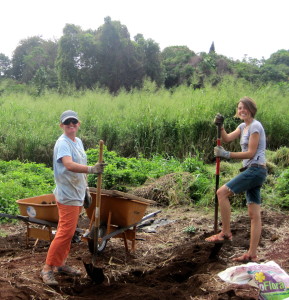By Tess Barnes Dunn, Academic Coordinator
 Recently, I had an opportunity to spend a day working with my new Pacific Quest colleagues in the area of our garden set aside for our Rites of Passage ceremony, known as Huli Ka’e.
Recently, I had an opportunity to spend a day working with my new Pacific Quest colleagues in the area of our garden set aside for our Rites of Passage ceremony, known as Huli Ka’e.
A rite of passage is an important event that serves to mark the passage from one stage of life to another. Rite of passage is an anthropological term for a ceremony performed to facilitate or mark a person’s change of status on highly important occasions. Belgian anthropologist Arnold van Gennep coined the term Rite of Passage in 1908. He examined rites of passage around the world and found that rites of passage involve three important stages:
- Severance in which an individual sheds his or her old identity
-
Threshold in which an individual has no status – they are both “no longer” and “not yet.”
-
Incorporation in which an individual returns and assumes a new role, typically with great celebration.
Our students experience severance, threshold and incorporation, they also explore perseverance, mystery and gratitude.
Throughout my day, I also explored and experienced my fair share of perseverance, mystery and gratitude.
Our first task was to eradicate the weeds and rocks. Let me rephrase that – our assignment was to eradicate the thousands of weeds and rocks. We worked together. Weeding. Laughing. Talking. Persevering. Together.
As we worked, I witnessed the mystery of the gardens – that transcendent quality that takes our students to the edge, creates change and celebrates rebirth. I listened to the Intent Statements of students, who had just completed the Rites of Passage ceremony. As they assumed their new role, they spoke of power, happiness, hope and dogged determination.
It was a day to remember. It was a day filled with joy, laughter and love and support. I was over-whelmed by gratefulness – gratitude for this garden and everyone in it.